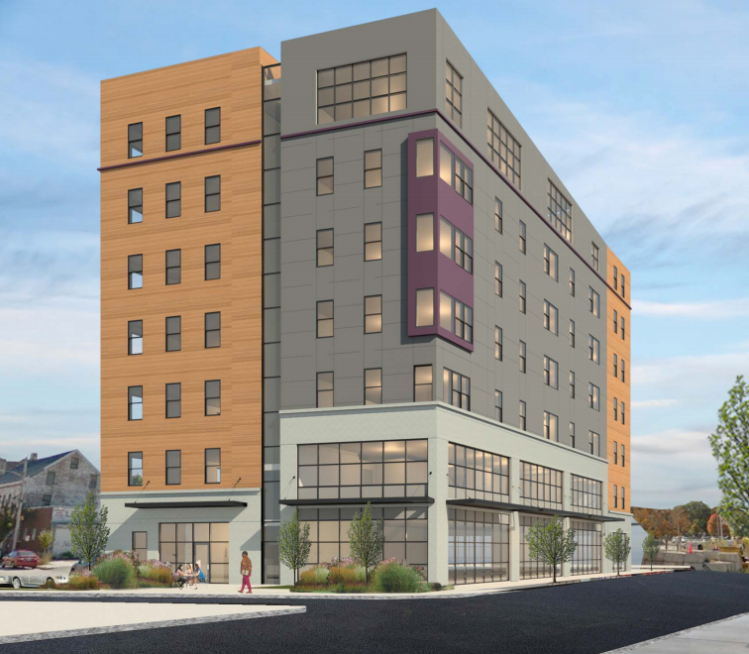The Portland City Council voted Monday night to approve tax breaks and consider funding awards for multiple senior and low-income housing projects, which could create more than 270 new apartments if all are built.
Those units would be a significant addition in the midst of a housing shortage in Maine’s largest city. Some would be market rate, but the majority would be rented to people with lower incomes, an area of particular need in Portland. Simon Thompson, a representative from the Portland Community Chamber of Commerce, emphasized the need for new residential development when he spoke in support of the proposals.
“The chamber believes housing is badly needed in the city of Portland across all income brackets,” he said.
The developments are not yet guaranteed because they are contingent on receiving additional subsidies from MaineHousing through a competitive statewide process, but Mayor Ethan Strimling said the city’s financial support is a critical component.
“But for this, they would not be able to receive the points that they need from MaineHousing,” Strimling said.
He also noted a new policy that requires contractors working on new developments that receive these tax breaks to pay their employees a prevailing wage.
“We know these projects will be built, and the workers on these projects will be paid a wage that allows them to live in the city,” Strimling said.
The council approved tax increment financing for a senior housing project at 178 Kennebec St. Developer Nathan Szanton and Bayside landowner Ross Furman have a purchase-and-sale agreement on the 0.22-acre parcel for $250,000.
Originally, the developer planned to build 50 units of housing over ground-level retail and/or artists’ space. A majority of the units would have been affordable to people making 60 percent of the local median income or less.
However, because of a change in state funding priorities, the council agreed Monday to alter the housing portion to be specific to seniors. The end result would be 46 apartments for age 55-plus residents, and 36 units would still be restricted to low-income tenants.
Under the tax increment financing agreement, the developer would receive 75 percent of the property taxes generated from the new development over a 30-year period, estimated to be $96,305 annually or $2.9 million over three decades. The city would receive an average of $32,102 for its general fund each year, which adds up to more than $963,000 by the end of 30 years. The city also would get the benefit of sheltering valuation, effectively adding an estimated $27,910 a year.
Councilor Kim Cook opposed the change to senior housing, but later supported the tax increment financing for the property.
“The whole project is age-restricted, and I’m seeing age-restricted developments being proposed around the city right now,” Cook said. “By continuing to just build 55-plus housing, we are restricting those who can live in our city when we are in the middle of a housing crisis.”
Sarah Michniewicz, president of the Bayside Neighborhood Association, spoke in favor of the project, praising the developer for seeking input from the nearby residents.
“In Bayside, they engaged early, listened carefully and responded meaningfully,” she said.
The council also approved tax increment financing for another senior housing complex at 977 Brighton Ave. Avesta Housing is developing 40 one-bedroom units for 55-plus residents.
The agreement would provide $65,150 annually to Avesta for 30 years – nearly $2 million in total. Portland’s general fund would get an estimated $21,717 annually, which adds up to more than $651,000 over three decades. The tax sheltering benefit is estimated to be more than $18,800 a year.
The council also gave initial consideration to Avesta’s request for $300,000 through the federal HOME Investment Partnerships Program, which provides block grants for local communities to build affordable housing.
Two other affordable housing projects also were considered for HOME funds Monday night. One is an additional $200,000 for another Avesta project, at Deering Place in Parkside, where the nonprofit plans to build 75 mixed-income rental units. This project already has received approval for $300,000 in HOME funds and a tax increment financing agreement with the city.
The Portland Housing Authority is seeking more than $580,000 in HOME funds for a project on Front Street in East Deering. The developer is proposing to demolish an existing complex and replace it with 111 low-income units.
The council must take final votes on all of the HOME funding awards.
Correction: This story was updated at 9:54 a.m., July 17, 2018, to reflect that Simon Thompson is a representative from the Portland Community Chamber of Commerce. A previous version of this story misstated his affiliation.
Send questions/comments to the editors.




Success. Please wait for the page to reload. If the page does not reload within 5 seconds, please refresh the page.
Enter your email and password to access comments.
Hi, to comment on stories you must . This profile is in addition to your subscription and website login.
Already have a commenting profile? .
Invalid username/password.
Please check your email to confirm and complete your registration.
Only subscribers are eligible to post comments. Please subscribe or login first for digital access. Here’s why.
Use the form below to reset your password. When you've submitted your account email, we will send an email with a reset code.